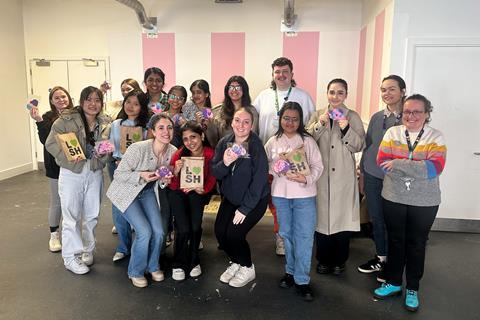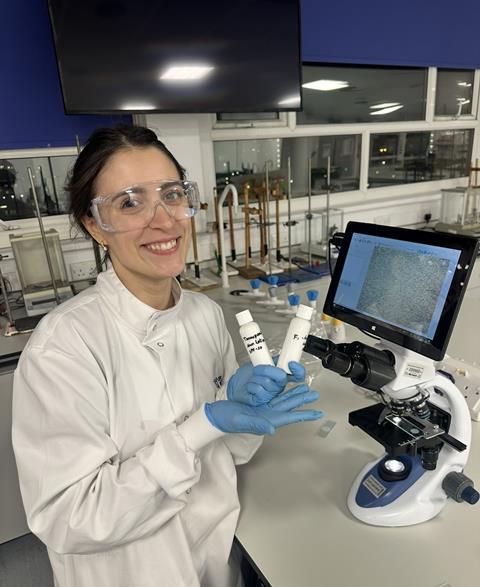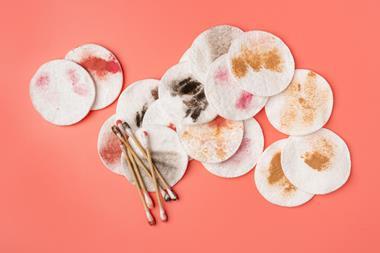Trailblazing course receives accreditation from the Royal Society of Chemistry

Chemistry students are often unaware of the cosmetic industry being a viable sector for long and fulfilling careers, despite often having many of the required skills. Aiming to change this idea is the recently accredited MSc cosmetic science course at Liverpool John Moores University (LJMU).
Despite common misconceptions, cosmetics does not just focus on make-up. The cosmetics industry produces a vast array of products for skin, hair, sun protection and even fragrances, generating several hundred billion pounds in revenue each year. However, there is a growing demand for products that are safe to use, increasing the need for more scientists that can formulate and test products (see p24).
Despite common misconceptions, cosmetics does not just focus on make-up. The cosmetics industry produces a vast array of products for skin, hair, sun protection and even fragrances, generating several hundred billion pounds in revenue each year. However, there is a growing demand for products that are safe to use, increasing the need for more scientists that can formulate and test products.
LJMU was the first university in the UK to offer an MSc cosmetic science programme back in 2017. The programme is now one of the most recruited master’s level courses at the university, with nearly 50 students signing up each year.
‘Everybody wants to look nice, they want to be clean, they want to be hygienic. And that’s what cosmetic products do,’ says Amanda Boddis, programme leader of the course. ‘The programme covers the whole life of a cosmetic product, ranging from when we start with an initial idea to where it ends with a consumer.’
Formulating a cosmetics chemist
Many students enter the course with a degree in chemistry, pharmacy or pharmaceutical science. ‘I realised [chemistry] wasn’t the exact route I wanted to go down, but I wanted to use the knowledge and skills that I’d learnt,’ said Alexandra Cowburn, a student who recently completed the course.

Another former student, Victoria Schunck de Godoy Guidi, took a slightly different route. After completing her chemical engineering degree, she took an industrial placement in cosmetic science before spending a stint as a small business owner making candles during lockdown. She chose to join the course to boost her career opportunities.
Students study formulation, toxicology and physiology, as well as courses in scientific principles and natural products in cosmetics. Aside from the science, modules in regulatory affairs, marketing and sustainability offer students a chance to understand the broader industry of cosmetics.
Practical classes heavily supplement the theory taught in the lecture theatre. Boddis explains that practicals typically involve students formulating and testing a product, involving the use of chromatography, spectroscopy and specific techniques used within the cosmetics industry, such as texture analysis and rheometry. ‘This course really prepares us to formulate and characterise products, focusing on the demands from regulations and consumers,’ says Guidi.
Partners and placements
Dotted throughout the course are educational trips where students develop their links with industry, aiming to improve their employability. Croda – a supplier of raw materials to the cosmetics industry – hosts the students for a day at its head office in East Yorkshire. Another trip closer to home is based at the Lush Liverpool store – the largest in the UK – to recreate a Lush product. Both opportunities allow students to ask for careers advice and gain industrial experience.
Nearing the end of the year-long course, students undergo a three-month research project, either at the university or in industry. Some students may opt to carry out a project in a hybrid capacity, for example, formulating a product with the university, while testing said product in industry (or vice versa). Boddis believes that this offers students the flexibility to explore both avenues, suiting personal and financial needs.

Industry partners typically include Unilever, L’Oréal, Croda and Josh Wood Colour, offering students options as to the kind of project they want to work on. Projects will differ in the extent of formulation and analysis involved, as well as the specific cosmetic products being studied. ‘The placement has been a highlight, it’s made me realise that everything I’ve learned so far has become really useful,’ said Cowburn, while on her 12-week long placement at Unilever.
After finishing the course, many students choose to stay within cosmetics, either in academia or in industry, the latter owing to the strong connections built on the course. Others choose to enter the field of cosmetics regulations, while some even go on to start their own businesses.
Boddis tells Chemistry World that she is ‘very proud that [the course] is now the first and only cosmetic science [master’s] programme to be accredited in the UK’. Non-accredited master’s-level cosmetic science courses are also offered by some UK universities; others only offer specialist cosmetic courses for existing medical or dental practitioners, rather than targeting those that want to work in a lab setting. ‘I guess you could say that we’ve been trailblazers,’ Boddis adds.
The LMJU course highlights the numerous scientific and practical skills needed for a successful career in cosmetic science. Boddis adds that she is ‘not sure if pure chemistry undergraduates understand the career options for them in cosmetic science’ but adds that she wants ‘to make the option more visible and more marketable.’

















No comments yet